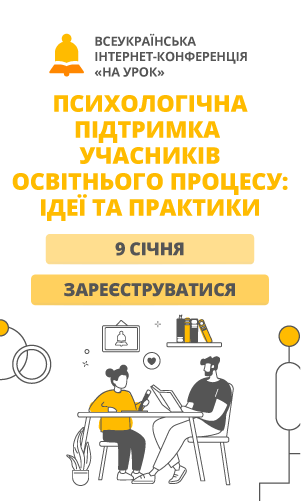Конспект уроку на тему "Довкілля"
Тема уроку: Глобальні проблеми. Введення нових лексичних одиниць за темою. Робота з текстом.
Цілі уроку
Практична:
1. Активізувати лексику з теми «Навколишнє середовище» в усному та писемному мовленні учнів.
2. Удосконалити вміння аудіювання та читання.
3. Навчити учнів складати відповіді щодо прочитаного та брати участь в обговоренні .
Освітня:
- Розширити кругозір учнів щодо способів вирішення екологічних проблем в іноземних англомовних країнах
Виховна:
- Виховувати бережливе ставлення до природи
Розвивальна:
- Розвивати комунікативні, аналітичні та творчі здібності, уяву та увагу учнів.
- Удосконалювати вміння порівнювати інформацію в монологічному та діалогічному мовленні.
Обладнання уроку: підручник, аудитивний текст, роздавальні картки зі словами, конверти зі завданнями до тексту (роздатковий матеріал)
Схематичний план уроку
1.Організаційний момент (5 хв)
2. Мозковий штурм (1 хв)
3. Робота з новими лексичними одиницями (10 хв)
4. Аудіювання тексту і бесіда за ним (10 хв)
5.Робота в групах (10 хв)
6.Підведення підсумків уроку (4 хв)
Хід уроку
І. Організаційний момент
Мета: привітання з учнями, знайомство, повідомлення завдань уроку
Методичний прийом: бесіда
-Good afternoon, pupils. My name is Inna Ihorivna and I’m your new English teacher today. Let’s get acquainted! Introduce yourself, using the first letter of your name for describing some traits of your character, for example :
Chrystyna – creative, Ihor – intelligent and so on.
- Well done! Today we’ll explore the topic of the environment, read very interesting story about the wildlife in Kenya and learn some new words to understand its message better.
II. Мозковий штурм
Мета : активізувати роботу учнів, залучити увесь учнівський колектив до роботи на уроці, заохочувати до роботи в парах
Методичні прийоми: висловлювання учнів
-Look at the pictures in your class books on p.11-12.
- It’s time to work in pairs. Read the title (‘Lion Lights’) and present your ideas, what is the text about.
ІІІ. Робота з новими лексичними одиницями
Мета: вивчити нові лексичні одиниці в складі словосполучень та речень
Методичні прийоми: повторення за учителем хором ; індивідуальне повторення нових лексичних одиниць окремо, в складі словосполучення та речень.
-First let’s learn some new words, connected with our theme. Listen and repeat one by one:
|
1. plain |
[pleɪn] |
рівнина |
|
2.spear |
[spɪər] |
спис |
|
3. depend |
[dɪˈpend] |
залежати |
|
4.charge |
[tʃɑːdʒ] |
заряджати |
|
5.estimate |
[ˈestɪmət] |
здогадуватися |
|
6. livestock |
[ˈlaɪv.stɒk] |
худоба |
|
7.allow |
[əˈlaʊ] |
дозволяти |
|
8. earn praise |
[ɜːn’ preɪz] |
здобути похвалу |
|
9. incredible |
[ɪnˈkred.ɪ.bl̩ ] |
дивовижний, чудовий |
-Well done! Now let’s use them in phrase:
1) plain terrain 2) sharp spear 3) depend on weather 4)charge the mobile 5)estimate the meaning 6)to shepherd the livestock 7) to allow the visit 8) to earn praise for work 9)incredible view
-Great! Now let’s make up sentences with them.
1) She likes to paint the plains in landscapes.
2) He used the spear for hunting.
3) Everything depends on your goals.
4) Many people charge their gadgets with solar energy.
5) You can estimate the meaning without vocabulary.
6) He used to shepherd the livestock.
7) Do your parents allow to go on tour?
8)It’s very pleasant to get the praise for your work.
9) Do you find this picture really incredible?
IV. Аудіювання тексту і бесіда за ним
Мета: навчити учнів сприймати і розуміти прослуханий текст, збагачувати словниковий запас учнів, вдосконалювати монологічне мовлення учнів шляхом формування поширеної відповіді на запропоновані запитання.
Методичний прийом: активне слухання і відповіді на запитання за текстом
1. Pre-listening task
-Listen to the text the first time, pay attention to the new words and try to understand its main idea.
-Listen to the text the second time and be ready to answer the questions:
1) Who is the main hero?
2) What’s his main invention?
3) Was this invention useful?
2. Discussion
T:- You’ve twice listened to the record. Let’s remind its main hero.
S.: -The main hero is a boy called Richard.
T: - What’s his main invention?
S: - He invented a system of lights .
T: - Right! Was this invention useful?
S: - Yes, because it protected his family’s cattle from lions.
V. Робота в групах
Мета: розвинути вміння працювати в парах, аналізувати прочитане та формувати поширені відповіді.
Методичні прийоми: робота в групах за допомогою опорних запитань, висловлювання учнів у межах 2-3 речень.
Учні об’єднуються в 4 групи за приналежністю до пори року, коли народились, та опрацьовують текст з підручника. Кожна група отримує конверт із запитанням, на яке повинні дати відповідь.
1. Instructions
-Please, join into 4 groups according to the seasons, in which you were born ( groups ‘Autumn’, ‘Winter’, ‘Spring’, ‘Summer’).
-Read the text from your classbooks on p.11-12 and be ready for discussion.
-Now choose the random envelop, open it and dwell on the questions in it.
The list of questions:
- Before Richard’s invention, what did the Maasai have to do each night?
- Why is it important that the bulbs in Richard’s invention flicker?
- Why are there so few lions in Kenya today?
- What makes Richard an ‘incredible boy’?
2. Checking the answers
Suggested Answer Key:
- Before Richard’s invention, what did the Maasai have to do each night? (They had to guard their cattle against lion attacks with spears)
- Why is it important that the bulbs in Richard’s invention flicker? (Because the lions are scared of moving lights.)
- Why are there so few lions in Kenya today? (The locals killed them to protect their cattle)
- What makes Richard an ‘incredible boy’? (He was clever and creative enough to discover away to help solve a difficult problem)
VI. Підведення підсумків уроку
-Summing up our lesson, try to answer the question: what can the main hero of our today’s story teach us? (He teaches us that we should find solutions to problems that don’t harm the environment or others. He came up with with a pollution-free system to save the lives of the cattle and the lions.)
- Thanks everybody! Today you’ve been discussing the rational ways of solving the environmental problem, learnt new words and how to use them in sentences, improved your skills working in groups and pairs. Your homework for next time is to learn new words and to be prepared with completing the sentences (ex.2, 4. р.11).
Your marks are…
See you later.


про публікацію авторської розробки
Додати розробку
